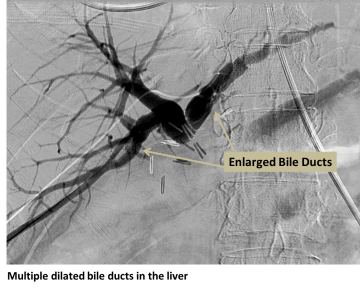Biliary Obstruction
Find your care
Our board-certified physicians diagnose and treat many vascular conditions. Call 310-481-7545 to learn more about interventional radiology services.
What is biliary obstruction?
Biliary obstruction is a blockage of the ducts that transport bile from the liver to the small intestine. Bile is made in the liver, stored in the gallbladder, and emptied into the small intestine via the bile ducts.
Bile is secreted to help digest fats. After a meal, fatty acids in the stomach cause the gallbladder to contract and release stored bile, but a blockage in the biliary ductal system will impede bile transport and will cause pain. Bile is continuously made in the liver. When bile cannot drain and builds up in the liver, bilirubin, a component of bile, increases in the urine and blood.

Risk Factors
The most common cause of biliary obstruction is gallstones, which are crystallized cholesterol concretions usually formed in the gallbladder. Risk factors for gallstones (cholelithiasis) are
- Females more than males
- Increasing age
- Family history
- Native American or Mexican American descent
- High cholesterol
- Obesity
- Rapid weight loss
- Pregnancy
- Increased estrogen
- Diabetes
- Total parenteral nutrition
- Cirrhosis (liver scarring)
- Severe hemolytic anemia
Other non-gallstone causes of biliary blockage include:
- Bile duct cancer
- Liver cancer
- Pancreatic cancer
- Metastatic cancer
- Pancreatitis
- Injury in the abdomen, including from surgery
Symptoms
- Abdominal pain in the right upper quadrant, especially after a meal or when pressure is applied to the area
- Nausea and vomiting
- Fever
- Dark urine
- Jaundice (yellowing skin)
- Pale stools
- Pruritis (itchy skin)
Diagnosis
In addition to a history and physical examination, the following tests are often performed:
- Abdominal ultrasound
- Abdominal CT scan
- Endoscopic retrograde cholangiopancreatography (ERCP), which uses a camera and x-ray dye to look at the bile ducts
- Blood and urine bilirubin levels
- Liver enzyme tests
Treatments
- Cholangiogram
- Biliary drainage
- Biliary stenting
For More Information:
For more information or to schedule an appointment with one of our IR physicians, please call 310-481-7545.